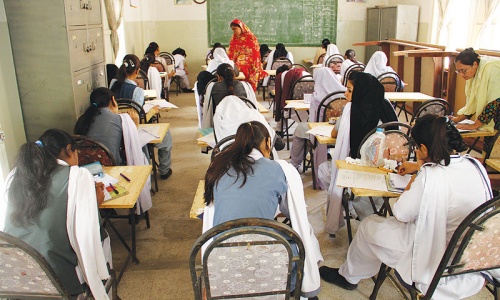ISLAMABAD: For years, Fatima would wake up in the morning and dream of going to school but her hopes for an education were crushed.
Rather than joining her two brothers in school, from the age of five Fatima would set off with her mother to work in the fields of their village in Bahawalpur district.
"I wanted to go to the school and wanted to become a teacher, so that I could help other girls," Fatima, now aged seven, said in a Skype interview from her home.
The daughter of a labourer, Fatima seemed destined to a cycle of illiteracy and poverty and to remain one of more than 13 million girls in Pakistan to never see inside a classroom.
Nearly half of Pakistan's 53m children aged 5-16 are out of school and 55 per cent of those are girls.
Pakistan has the third largest number of out-of-school girls in the world, a fact that hit headlines globally in 2012 after Taliban militants shot 14-year-old schoolgirl and education advocate Malala Yousafzai, now a Nobel Peace prize laureate.
Now amid this largely patriarchal society, Pakistani women, be they educated campaigners or illiterate mothers, are at the forefront of advocating for girls' right to school.
Fatima's luck changed when local community workers visited her family and, after several meetings, backed her mother and convinced her father to send her to the nearby school, breaking the traditional norm of keeping girls at home.
"My wish came true and I was able to go to school. I like to play with my friends. Teachers are very kind and they take care of me," Fatima said, her dark brown eyes glistening with joy.
She became one of 73,000 children enrolled in school due to a joint project launched in 2013 by Alif Ailaan ─ an education reform campaign funded by the United Kingdom Department for International Development but run by Pakistanis ─ and local non-profit organisation, Rural Support Programmes Network (RSPN).
The project has helped raise awareness in rural areas about the importance of learning as well as mobilise communities to demand quality education for their children from their political representatives and education department officials.
Women campaigning for girls
Despite a constitutional article guaranteeing the right of every child in Pakistan to a free education, social researchers blame poverty, a conservative culture and run-down school facilities for the decision by many poor families to keep their children, especially their daughters, from school.
RSPN says much of the success of the project is owed to its grass-roots community and village campaigners who use creative ways to get their message across such as public walks through the villages to raise awareness and coordinating with religious leaders to spread the word.
Social workers report that the most frequently reported reason for girls not attending school is their parents' unwillingness, citing difficult access to schools, poverty, and cultural sensitivities.
A recent Oxfam report said 11pc of young girls in Pakistan are married before the age of 15, jeopardising their rights to health, education and protection and fathers needed to be convinced that education was a better path.
Uzma Nazir, a campaigner in Bahawalpur, found that in one case she had to appeal to a father's sense of religious duty as well as his guilt over spending excess cash on tobacco.
"If you could afford to smoke daily and have enough money for Dish TV, then it meant that you could afford to pay for your children's educational expenses," Nazir said she told him.
She added that every Muslim man and woman had the responsibility for gaining an education. In the end she helped him enrol his three daughters in school.
Another effective argument that campaigners use are the economic advantages to an education.
It wasn't hard to convince Sukhaan Mai to send all her seven daughters and son to school.
Mai, who lives in a village 40 kilometres from Dera Ghazi Khan, earns Rs.8,000 a month, working as a day labourer, picking cotton and harvesting wheat in peak season.
Her biggest wish was for a better life for her children, which included sending them all to school, especially her physically-challenged daughter Memoona, 12.
"If my children will get an education there will be so many benefits in their future for better livelihood and they will gain the knowledge about good and bad," said Mai in a Skype interview from her home.
According to the United Nation's International Labour Organization (ILO), about 75pc of Pakistani working women aged 15 and above were in the agricultural sector in 2010-2011 where working conditions were harsh and the wages were low.
Global evidence suggests that one additional year of schooling can increase a woman's earning by 10 to 20 pc.
So far, the project has raised the awareness of nearly 250,000 people about the value of education.
Rural communities have also lobbied for improvements in 741 schools ─ many of which were functioning without electricity, had no drinking water, and were missing toilets and boundary walls.
But social workers say there is still much work to be done.
"In Pakistan, there is a need of an environment where equal access to education is provided from birth. If we manage to do that... I guarantee that will lead to a brighter and prosperous future," said Mosharraf Zaidi, campaign director of Alif Ailaan.













































